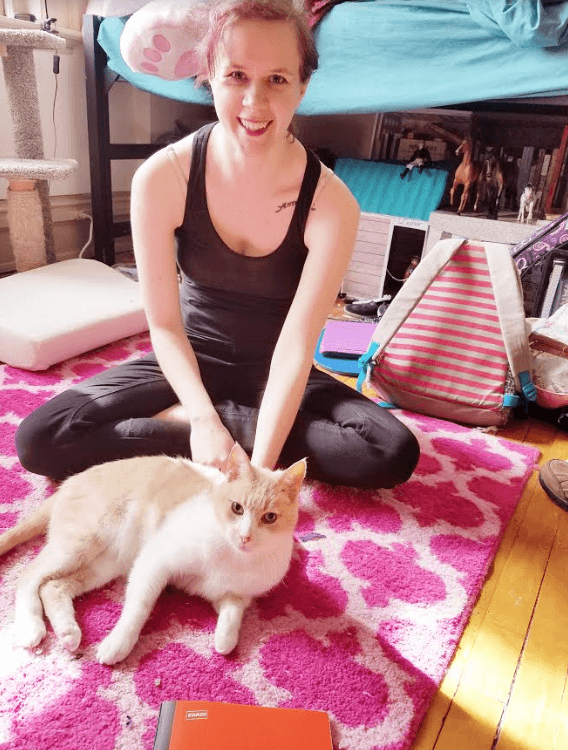Therapy cat finds place in dorms, offers support to UMW student
3 min read
Gary Knowles | The Blue & Gray Press
By GARY KNOWLES
College is hard. For many it is the first time they have become independent from their families and are left to make their own choices and decisions on a day-to-day basis. Most would think that not having someone there would lead to great new experiences.
However, sometimes the changes that come with college are not as easy for some. Miranda Schnakenberg, a University of Mary Washington senior studying creative writing, is one student whose journey has not been all independence and sunshine. She suffers from depression and anxiety. Thanks to the UMW Office of Disability Resources, Schnakenberg’s journey has been made a little easier with her cat, Gatsby, by her side.
For a student who lives on campus, it is extremely hard to get a pet unless it is a fish. In Schnakenberg’s case, her cat serves a different purpose from being a pet. Gatsby exists on campus as an emotional support animal. The guidelines for support animals are that it must be an animal that provides emotional support or otherwise improves a person’s condition with their disability.
Gatsby lounged on the shaggy pink carpet clawing at Schnakenberg as she explained that her journey to getting permission to have Gatsby. Emotional support animals are covered by the Fair Housing Act and allows Schnakenberg to keep Gatsby in her dorm room on campus. Schnakenberg had to get a prescription from her psychiatrist to show that it would be beneficial for Schnakenberg’s condition to have a support animal.
With the diagnosis and prescription, Schnakenberg completed and turned all the required paperwork to the Office of Disability Resources, along with accommodations paper work.
Initially, in an email Schnakenberg had received a positive response to her request to have Gatsby on campus. But, a tunnel of paperwork delayed the process of Schnakenberg getting Gatsby. After what almost turned into a legal dispute initiated by Schnakenberg, Disability Resources granted permission for her to have Gatsby on campus.
“Since then I’ve had friends who have applied to have emotional support animals and have been accepted without issues,” Schnakenberg said.
She’s glad to know that other people have an easier time with the process of getting an ESA after what happened with her case.
When asked about how Gatsby benefits her daily, Schnakenberg revealed that because of her depression she has trouble dealing with being alone for long periods of time. Gatsby, goes out of his way to cuddle, play alongside, and comfort Schnakenberg. She’s had Gatsby since the spring of 2016. Schnakenberg, after her experiences with Gatsby, has said that Gatsby, “love’s her unconditionally” which helps with the feelings of loneliness she experiences. Schnakenberg did recount how spoiled Gatsby has become now with his food and care. But, despite any unforeseen spoiled cat issues, the two are inseparable.
“He’s also someone to take care of and someone to live for because if I don’t get out of bed he doesn’t get fed,” Schnakenberg said, “and he’s not having that.”
So, in addition to the comfort, Gatsby keeps Schnakenberg motivated because he relies on her just as much as she relies on him.












People always confuse service dogs, emotional support dogs and therapy dogs and insist that emotional support animals are fake service animals. Emotional support animals are only allowed in housing and airplanes. We need more information on this subject and more college campuses need to identify the differences instead of blanket prejudice and discrimination of these animals. Theres a great reference on the legalities of emotional support animals in college below.
https://esadoctors.com/emotional-support-animal-college-dorms/